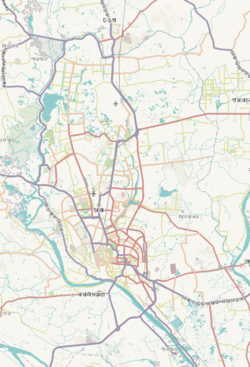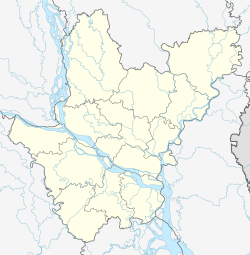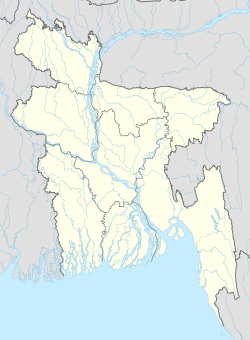Segunbagicha
Segunbagicha
সেগুনবাগিচা | |
|---|---|
 Skyline of Segunbagicha | |
 Expandable map of vicinity of Segunbagicha | |
| Coordinates: 23°44′03″N 90°24′28″E / 23.734032°N 90.4076745°E | |
| Country | |
| Division | Dhaka Division |
| District | Dhaka District |
| City | Dhaka |
| City Government | Dhaka South City Corporation |
| Thana | Shahbag |
| Ward | Ward No. 20 |
| Time zone | UTC+6 (BST) |
| Postal Code | 1000 |
| Area code(s) | +880, +880 2 |
| Notable sport teams | PWD Sports Club |
Segunbagicha (Bengali: সেগুনবাগিচা, romanized: Shegunbagicha, lit. 'Garden of the Teaks') is an upscale residential, administrative, commercial, and institutional neighbourhood[1][2][3] in south-central Dhaka.[4] The neighbourhood is one of the important areas of Dhaka featuring a large number of government and residential complexes.[5] It acts as a bridge between the major thanas of Ramna, Shahbagh, Dhanmondi, Paltan and Motijheel, and is located at the crossroads of Ramna, Shahbag and Paltan thanas.
Segunbagicha is a centre of government office building and institutions[5] including the headquarters of The Directorate General of National Security Intelligence, Anti-Corruption Commission (commonly known as duduk; দুদক),[6] Motsho Bhobon (building of Department of Fisheries), Bangladesh Secretariat, the International Mother Language Institute, Bangladesh Shilpakala Academy,[7] the Public Works Department, the Bangladesh Department of Architecture, the Ministry of Foreign Affairs as well as several tax zones.
History
[edit]During the British Bengal era, two English officers, Captain Graham and Colonel Stecky built a garden in the area. Among all the plants in the garden, there were numerous teak trees, called segun (pronounced as shegun) in Bengali. The neighbourhood got its name for the teak trees it contained. The responsibility of the area was then handed over to the municipality after the officers moved to another part of Dacca. The municipality then decided to cut down the trees.[8]
In the late 1940s, Segunbagicha was a desolate and solitary area, located on the outskirts of the Dacca city. It was sparsely populated, but it hosted mostly Hindu intellects and used to be a residential colony where many educated doctors, lawyers, teachers and other intellects resided. However, Segunbagicha quickly became occupied due to the influx of migrants. The first Chinese restaurant in Dhaka (then Dacca), "Café China", was set up in the neighbourhood.[9][10][11]
According to Bangladeshi writer Qazi Anwar Hossain, there were only a few low-rise buildings in the sparsely populated Segunbagicha in the 1950s. The area also hosted a huge swamp.[12]
Muhammad Ibrahim, a Bangladeshi physician, who later founded the Bangladesh Institute of Research and Rehabilitation in Diabetes, Endocrine and Metabolic Disorders at Shahbagh, set up a tin-shed out-patients clinic in Segunbagicha in the 1950s to fight diabetes.[13][14]
When the country's founder Sheikh Mujibur Rahman was appointed as the first Bengali chairman of the Pakistan Tea Board, he moved to the erstwhile 115 Segunbagicha. After Mujib was arrested, his family moved to the erstwhile 76, Segunbagicha. After he was released, him and his family moved to Dhanmondi.[15]
Bangladesh Shilpakala Academy, the primary cultural centre of Bangladesh was set up in 1974 in Segunbagicha.[16]
Etymology
[edit]Segunbagicha is a junction of two Bengali words, Segun (Bengali: সেগুন, romanised: Shegun), meaning teak (Tectona grandis), which is a species of plant native to South and Southeast Asia and Bagicha (Bengali: বাগিচা, romanised: Bagicha), meaning garden. Therefore, the name "Segunbagicha" literally translates to "The Garden of Teak" or "The Garden of Teak Trees". The naming therefore suggests that this location was once a site of teak trees.[8]
Geography
[edit]The coordinates of this area are approximately 23°44′03″N 90°24′28″E / 23.734032°N 90.4076745°E. To the north of Segunbagicha lies Kakrail of Ramna and to the west lies the Supreme Court of Bangladesh and the iconic Ramna Park. Paltan Thana is to the east of Segunbagicha, of which the Bijoy Nagar-Purana Paltan area borders the area. Areas like Moghbazar, Eskaton, Malibagh, Motijheel, Paltan, Shantinagar, Ramna, Bailey Road, Shahbagh neighbourhood, Siddheswari, Dhaka University campus area, New Market and New Elephant Road are also adjacent to Segunbagicha. Segunbagicha is located in the south-central part of Dhaka and falls under the jurisdiction of Dhaka South City Corporation and is located in Shahbagh Thana, and formerly in Ramna Thana. The area is a part of Word No. 20 of DSCC. It was previously a part of Ward No. 56 of DCC. Segunbagicha is within the boundaries of Dhaka-8 constituency of Bangladesh Jatiya Sangsad.
Notable institutes
[edit]Government institutions
[edit]- The Directorate General of National Security Intelligence HQ
- Anti Corruption Commission[17](commonly known as ACC; দুদক)
- Department of Fisheries and Ministry of Fisheries and Livestock[18]
- International Mother Language Institute[19]
- Public Works Department[20]
- Department of Architecture (Bangladesh)
- Ministry of Foreign Affairs (Bangladesh)[21]
- Department of Narcotics Control[22]
- National Press Club
- National Housing Authority
- Bangladesh Secretariat
- Ministry of Education
- Department of Explosives
- Bangladesh Press Council[23]
- Geological Survey of Bangladesh
- Customs Bond Commissionerate (CBC), Dhaka[24]
- Health Economics Unit
- Office of the Controller General of Accounts
Cultural centres
[edit]Medical institutions
[edit]Corporate offices
[edit]- Gazi Television (GTV)
- Super Star Group[26]
- Techno Drugs Ltd.[27]
- Synovia Pharma, a subsidiary of BEXIMCO Pharmaceuticals[28]
Education
[edit]- Ibrahim Medical College[29]
- Segunbagicha High School
- Ideal Model Government Primary School
- Begum Rahima Ideal Girls High School
- National Academy for Autism and Neurodevelopmental Disabilities
- Dhaka Law College
Culture
[edit]Segunbagicha is home to the Bangladesh Shilpakala Academy, perhaps the largest cultural centre in the country.
During Bangla New Year, Segunbagicha bustles with vibrant stalls, people with cultural attires and accessories and splashes of various cultural symbols of Bengal floats all across the neighbourhood.
The prime reason for such attraction of crowds during cultural seasons in this neighbourhood is its strategic location. The area sits on and beside the University of Dhaka, the Ramna Park, the Ramna Race Course (officially the Suhrawardy Udyan), the International Mother Language Institute and the Shilpakala Academy.
Transportation
[edit]Important roads like Topkhana Road, Moulana Bhasani Road, Segun Bagicha Road, Abdul Ghani Road and the National Eidgah Street run through and around the neighbourhood.
Segunbagicha has a metro station called Bangladesh Secretariat, which lies on MRT Line 6 of Dhaka Metro Rail on the route from Uttara North towards Motijheel.[30] The station building is located near the Bangladesh Secretariat, Press Club and the Ministry of Foreign Affairs.Note that the next Kamlapur MRT Station is under construction,so all trains just end every trip in Motijheel,then again start trip to Uttara North MRT Station including all stations.
Gallery
[edit]-
Skyline of Segunbagicha
-
Department of Architecture, HQ
-
Road in the Segunbagicha-Kakrail area
-
Public Works Department, HQ
-
Anti Corruption Commission HQ, Segun Bagicha
References
[edit]- ^ "Shantinagar & Shiddheswari Area Guide - Bproperty". Bproperty Area Guides. Retrieved 2024-02-22.
- ^ "Obesity on rise in Bangladesh children owing to junk food, unhealthy lifestyles". www.aa.com.tr. Retrieved 2024-02-23.
- ^ "Segunbagicha: From Dhaka's cultural capital to a commercial centre". The Business Standard. 2024-05-11. Retrieved 2024-05-14.
- ^ "Residential building catches fire in Dhaka's Segunbagicha". bdnews24.com. Retrieved 2023-06-22.
- ^ a b Siddiqui, Kamal; Ahmed, Jamshed; Siddique, Kaniz; Huq, Sayeedul; Hossain, Abul; Nazimud-Doula, Shah; Rezawana, Nahid (2016-04-01). Social Formation in Dhaka, 1985-2005: A Longitudinal Study of Society in a Third World Megacity. Routledge. ISBN 978-1-317-05400-9.
- ^ "5 bank officials held for embezzling gold jewellery worth 11.4C". Dhaka Tribune. 2021-02-16. Retrieved 2023-06-22.
- ^ "Bangladesh Shilpakala Academy". Banglapedia. Retrieved 2023-06-22.
- ^ a b "পুরান ঢাকার সাতসতেরো". সোনালী নিউজ. Retrieved 2024-05-01.
- ^ "Dhaka". Banglapedia. Retrieved 2024-05-01.
- ^ Nilufar, Farida (1997). The Spatial and Social Structuring of Local Areas in Dhaka City - A Morphological Study of the Urban Grid with Reference to Neighbourhood Character within Naturally-grown Areas (PhD thesis). University College London.
- ^ Jamil, Syed Maqsud (2013-08-02). "Eateries of Dacca". The Daily Star. Retrieved 2024-05-01.
- ^ সেগুনবাগিচা. Kaler Kantho (in Bengali). 31 May 2019. Retrieved 2024-05-01.
- ^ "The Founder". Ibrahim Cardiac Hospital & Research Institute. Retrieved 2024-05-01.
- ^ Mazid, Muhammad Abdul (2012-09-06). "National Professor Mohammad Ibrahim: A Believer In Change". The Daily Star. Retrieved 2024-05-01.
- ^ "Bangabandhu's Dhaka life: From 150 Mughaltuli to Dhanmondi 32". Dhaka Tribune.
- ^ "Bangladesh Shilpakala Academy". Banglapedia. Retrieved 2024-05-01.
- ^ "দুদক প্রধান কার্যালয়ের ঠিকানা".
- ^ "No.33.00.0000.109.25.017.14.421" (PDF). Ministry of Fisheries and Livestock.
- ^ "Research is vital to preserve, revitalise and develop mother languages: PM". The Business Standard.
- ^ "Public Works Department". old.pwd.gov.bd. Retrieved 2024-01-31.
- ^ "Ministry of Foreign Affairs". mofa.gov.bd. Retrieved 2024-01-31.
- ^ "Revised narcotics control law gets tough with drug traders". Dhaka Tribune.
- ^ "Official Contact". Press Council.
- ^ "Customs Bond Commissionerate,Dhaka". cbc.gov.bd. Retrieved 2024-01-31.
- ^ "Birdem General Hospital-2". BIRDEM General Hospital. 2018-03-05. Retrieved 2024-01-31.
- ^ "SSG - contact". www.ssgbd.com. Retrieved 2024-01-31.
- ^ "Techno Drugs Ltd". technodrugsltd.com. Retrieved 2024-05-14.
- ^ "Contact Us".
- ^ "HOME". imc.ac.bd. Retrieved 2024-01-31.
- ^ "Metro rail is expected to trigger a paradigm shift in commute". The Financial Express. Retrieved 2024-01-31.









